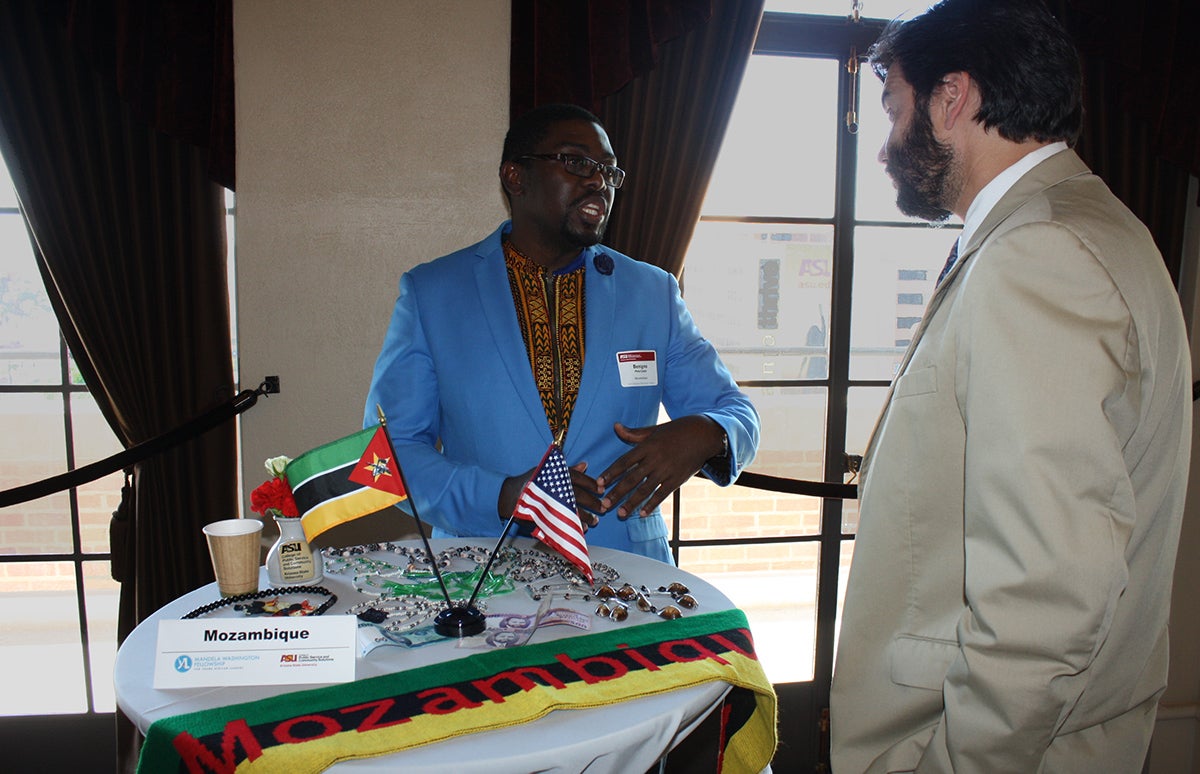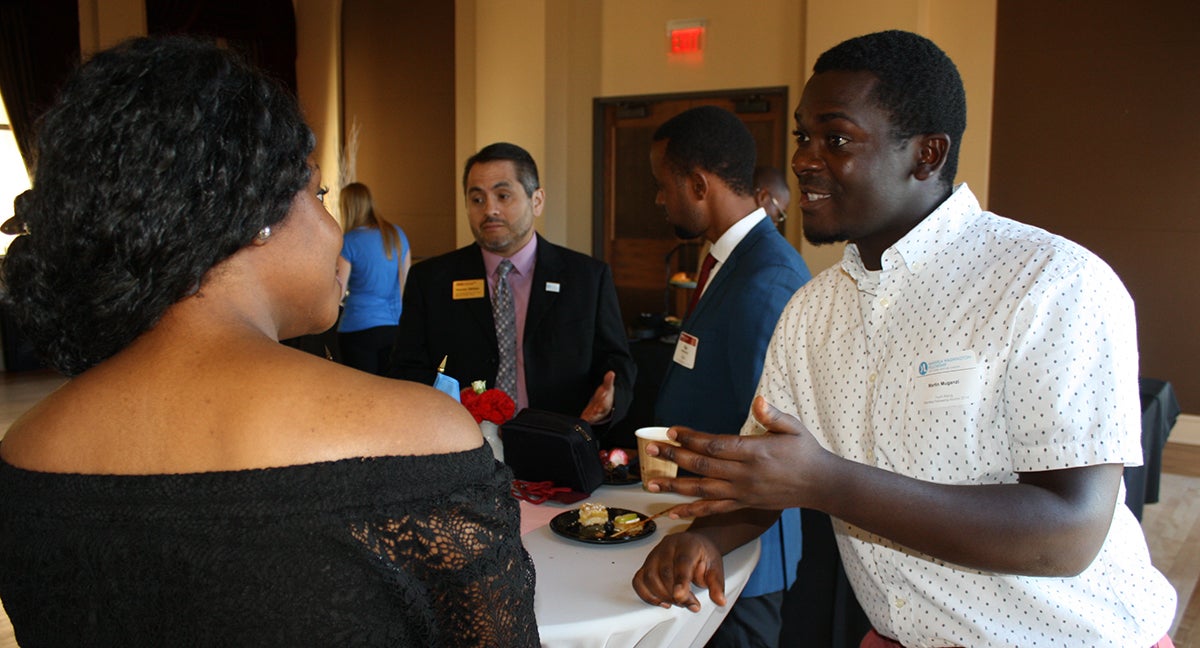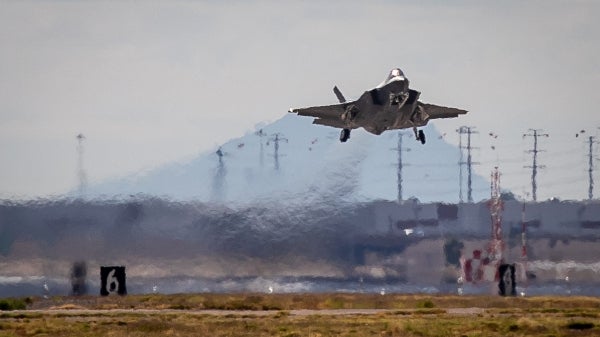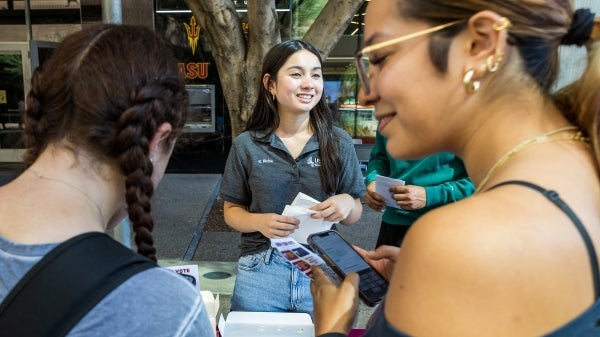Solving community challenges in Africa: ASU hosts up-and-coming leaders

Mandela Washington Fellows Janet Leparteleg (far left) and Daniel Mbonzo (far right) at a reception hosted by the College of Public Service and Community Solutions.
Benigno Canze smiles and extends his hand as a woman approaches his table at a welcome reception held June 22 at the Maricopa County Security Building ballroom in downtown Phoenix.
Dressed in a periwinkle blue suit over a vivid orange and navy blue shirt, the Mozambique medical administrator is one of 25 professionals from 17 sub-Saharan African countries attending a six-week training program hosted by Arizona State University’s College of Public Service and Community Solutions. They’re part of a U.S. Department of State leadership program called the Young African Leaders Initiative or YALI. It was created by former President Barack Obama to help educate the next generation of leaders in Africa. This is the fifth year ASU is hosting YALI fellows.
Canze started a nonprofit in Mozambique named Kumbatiro that helps pregnant women and young children receive the medical information and attention they need. He’s hoping to learn what it takes to expand his program to serve more mothers and small children.
“It's painful for me when I see that these small kids are condemned,” Canze said. “Some of them are born HIV-positive because their mothers are not receiving medical assistance. So, I would like to change this.”
A couple tables away Janet Leparteleg and fellow Kenyan Daniel Mbonzo discuss their goals as Mandela Washington Fellows. Mbonzo, a registered nurse, created a program to help people who are in poor health or suffer chronic illness receive proper diagnoses and treatment. Leparteleg, a financial cybersecurity specialist, began computer clubs at high schools in the northern Kenyan town of Maralal to encourage more young women to study science, technology, engineering and mathematics, or STEM.
“I started training the girls for careers in STEM because there's a huge gap for women in technology for sure, and where I come from girls rarely go to school,” Leparteleg said. “And if they get to school they don't get to go through the mainstream careers. The option they're given is either teaching on nursing.”
Jonathan Koppell, dean of the ASU College of Public Service and Community Solutions, formally welcomed the fellows and community members to the reception.
“Every year, we are blown away by the talent that is brought to us by the Mandela Washington Program,” he said.

Benigno Canze of Mozambique talks to Jonathan Koppell, dean of the College of Public Service and Community Solutions, at a reception held for the 2018 Mandela Washington Fellows in downtown Phoenix.
Koppell explained that while the young African leaders travel to Arizona to learn, those who come in contact with them end up learning quite a bit from the fellows.
“When we tell people about this program, we always want to make clear that this isn't a group of visiting students,” Koppell said. “These are highly accomplished professionals who have done things in circumstances that we would view as an impossible set of challenges and need to be recognized as such.”
The event is the first opportunity for the 25 young African leaders to meet local professionals, college staff and instructors from the Bob Ramsey Executive Education program in the School of Public Affairs. Over the next six weeks, the fellows will learn how to be effective public managers and leaders through a series of lectures, workshops and visits to governmental and nonprofit organizations throughout the state. Mandela Washington Fellows are assigned community mentors to advise them and are introduced to people in their field who can help them succeed.
Martin Muganzi was in the first class of fellows to study at ASU in the summer of 2014. He had started an organization in Uganda to address his country’s alarming school dropout rate. Seven in 10 children stop going to school. Muganzi knew what he wanted to do — create vocational and career training — but didn’t know how to accomplish it.
“When I was here I met a number of young Africans very much doing the same thing in their home countries, and they shared a lot of their experiences,” Muganzi said. “And then we met a number of organizations and faculty who had the same kind of experience with the ideas we're trying to implement back in Uganda.”

Martin Muganzi of Uganda came to Arizona State University in 2014 as a Mandela Washington Fellow.
He left Arizona confident he could get primary school dropouts to learn a vocational trade and improve their lives. What started as a two-person organization operating out of one center quickly grew after his return.
“Now we have about 30 staff in the space of four years, and we just keep growing,” Muganzi said. ”This opportunity — being a Mandela Washington Fellow — was like a confirmation that you can do this.”
Before they leave, each fellow will develop and present a plan identifying the community need they are addressing and how they plan to tackle it. Before they return home they will spend a week in Washington, D.C., with 700 other fellows who are studying at different American universities.
"Africa has a lot of potential, and I just love the fact that the U.S. is sponsoring this,” Leparteleg said. “It gives us an opportunity to come out of our shells and be the leaders that we want to see our continent get to the next level.”
More Local, national and global affairs

ASU creates pathways to public service careers for military students
The School of Public Affairs at Arizona State University is making careers in public service easier to access for military…

Minting community leaders and stellar citizens: ASU’s Public Service Academy approaches 10-year milestone
Airports that are easier to navigate.Health care that is simple to access.Helping underrepresented youth reach college.These are…

'War Game' documentary highlights threats of extremism to national security
The riots at the U.S. Capitol on Jan. 6, 2021, were a wake-up call that political divisiveness can turn violent, threatening the…